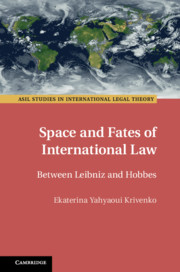Book contents
- Space and Fates of International Law
- ASIL Studies in International Legal Theory
- Space and Fates of International Law
- Copyright page
- Dedication
- Contents
- Note on Uses of Leibniz’s and Hobbes’s Works and Abbreviations
- Introduction
- 1 Science and Law in the Seventeenth Century
- 2 Space
- 3 The Idea of Universals and Human Cognition
- 4 Law
- 5 Intermezzo
- 6 Space(s) of International Law
- Conclusions and the Way Forward
- Bibliography
- Index
4 - Law
Published online by Cambridge University Press: 20 August 2020
- Space and Fates of International Law
- ASIL Studies in International Legal Theory
- Space and Fates of International Law
- Copyright page
- Dedication
- Contents
- Note on Uses of Leibniz’s and Hobbes’s Works and Abbreviations
- Introduction
- 1 Science and Law in the Seventeenth Century
- 2 Space
- 3 The Idea of Universals and Human Cognition
- 4 Law
- 5 Intermezzo
- 6 Space(s) of International Law
- Conclusions and the Way Forward
- Bibliography
- Index
Summary
This chapter critically examines Hobbes’s and Leibniz’s positions in relation to the concept of law and its role in regulating life of human communities. In line with his materialist stance and the controllability of space and discourse, Hobbes postulates the idea of the state and sovereign as central controlling devices able to create universality within a limited terriotry through control. Hobbes’s view of the state of nature and transition to the commonwealth are examined anew form this perspective. Leibniz’s concept of law is determined by the centrality of the concept of justice to his philosophy. Precepts of justice as eternal and universal truths discoverable by human beings shall inform accrding to Leibniz positive law within individuals human communities. However, he does not posit a particular form of life in common as determining but accepts diversity of political forms. Normativity of law in Leibniz derives not from its character of a command, like in Hobbes, but from a particular internal disposition of human beings, which in turn is determined by the internalisation of eternal truths as items constituting that logical grounding against which the human existence unfolds.
- Type
- Chapter
- Information
- Space and Fates of International LawBetween Leibniz and Hobbes, pp. 88 - 126Publisher: Cambridge University PressPrint publication year: 2020

